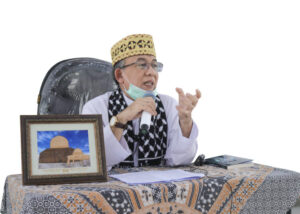
Islam
in the utmost beautiful way. (Foto:Onislam)" width="300" height="225" /> Allah has commanded believers to debate and argue whilst conveying the message of Islam in the utmost beautiful way. (Source: Onislam)By: Sadaf Farooqi*
I often receive requests via email from sisters in Islam who are embroiled ‘knee deep’ in online debates.
They ask me to help provide them with jurisprudential evidence and proofs that would refute their opponents’ stance/point of view, and establish theirs to be the more correct one, according to Islam.
Believe it or not, one was embroiled in an online argument with her husband (after their nikah contract was done) about her rights in Islam as his lawful wife, and another was using her husband’s alias/nick to debate another Muslim brother on an online forum.
Also Read: Imaam Yakhsyallah: Nurture Love for the Prophet, One Will Be with Whom One Loves
As a blogger, I am well-aware of the temptation of becoming involved in online arguments and debates (particularly in the comments sections under blog posts and Facebook status updates). Arguments here can often erupt between people who decide to challenge others’ views in public, or to simply express their own in order to bring another point of view into the bigger picture.
Most, if not all of the people involved in these debates have good intentions, especially when they are between Muslims who truly fear Allah and sincerely want to act upon Islam as much as they can in their personal lives.
The funny thing is that when these debaters meet in person, they forget not just their online arguments, but also meet each other with utmost cordiality, as if there had never been a bone of contention between them in the first place!
So is it really that online digital media brings out a desire in all of us to have our opinion seem better than others’? To have a better online presence for ourselves, and the greater fan following?
Also Read: Thanksgiving: An Islamic Perspective
And is it a coincidence that the older scholars of our ummah currently have the most muted online “voices” (or none at all), whereas the younger and comparatively lesser learned activists, students, teachers, and propagators of Islam, are the ones most actively involved in online debates?
Beautiful’ Debating Turns Foe into Friend
Allah has commanded believers to debate and argue whilst conveying the message of Islam in the utmost beautiful way. There are two specific verses in the Quran that guide us regarding this matter.
However, before we see what the Quran says about arguing, we all should acknowledge that, when someone becomes a role model of Islam because of their outwardly ‘Muslim’ behavior (e.g. praying in a public place) or due to their appearance (e.g. by donning hijab, or growing a long beard), they inadvertently find themselves emulated by some people, and regarded with apprehension and intrigue by others. They thus automatically become ‘callers’ towards Islam (‘da’ees’).
Also Read: Achieving the Position of Fasting Expert with Kindness of Morality
Allah guides us about da’wah in the Quran:
ادْعُ إِلَىٰ سَبِيلِ رَبِّكَ بِالْحِكْمَةِ وَالْمَوْعِظَةِ الْحَسَنَةِ ۖ وَجَادِلْهُمْ بِالَّتِي هِيَ أَحْسَنُ ۚ إِنَّ رَبَّكَ هُوَ أَعْلَمُ بِمَنْ ضَلَّ عَنْ سَبِيلِهِ ۖ وَهُوَ أَعْلَمُ بِالْمُهْتَدِينَ
Call to the way of your Lord with wisdom and goodly exhortation, and have disputations with them in the best manner; surely your Lord best knows those who go astray from His path, and He knows best those who follow the right way.(QS: An-Nahl : 125)
Just after commanding believers to invite others towards Islam with wisdom and a beautiful way of preaching, Allah gives them the guidelines about arguing as well. This is because Allah knows better than us how, where ever and whenever there is any da’wah effort, big or small, situations involving debates and arguments can crop up, which the da’ee will have to face.
Also Read: The Power of Charity in Ramadan
In another verse in the Quran, Allah gives us the formula for converting those between whom and us there is any level of enmity, into a close friend:
وَآتَاكُمْ مِنْ كُلِّ مَا سَأَلْتُمُوهُ ۚ وَإِنْ تَعُدُّوا نِعْمَتَ اللَّهِ لَا تُحْصُوهَا ۗ إِنَّ الْإِنْسَانَ لَظَلُومٌ كَفَّارٌ
And He gives you of all that you ask Him; and if you count Allah´s favors, you will not be able to number them; most surely man is very unjust, very ungrateful. (QS:Ibrahim:34)
The above two verses of the Quran give us guidance on undertaking the most beautiful way of preaching as callers towards Islam, and per chance we find ourselves in a situation where someone challenges us about our Islamic beliefs and asks us to enter into an argument, debate, or back-and-forth dialogue with them, we should argue with them in the most beautiful way possible.
Also Read: Ramadan Brings the Change
It goes without saying that arguing “beautifully” implies using the most respectful, humble, and amiable tone of voice and facial expression.
In the online world, it would mean being extremely careful about our choice of words while we engage in debate.
The Sunnah is to Avoid Arguments
This world is a period of tests and trials, both when times are good, and when times are bad. And things can get ugly even when a Muslim follows the guidelines of the Quran regarding beautiful preaching and debating.
Also Read: Ramadan, the Month of Education
As outlined above, it often happens that even though a caller to Islam undertakes the most beautiful way of arguing with those who challenge or debate them, things can get heated very quickly, and tones can become extremely disrespectful, whether in person or online, in writing.
It is not long before boundaries are crossed and personal attacks, insults, curses, abusive language and even negative supplications are hurled back and forth.
In the world of online social media, the anonymity and physical distance afforded by a digital screen, from behind which someone starts and/or contributes to an argument or debate about Deen, makes it easier to become vicious or disrespectful whilst engaging in debates.
At such a time, it is imperative that the caller to Islam or da’ee obeys the command of Allah and His Messenger, and immediately leaves that place where the argument is taking place.
Also Read: Come on Do I’tikaf
Prophet Muhammad, peace be upon him, left the side of his companion Abu when the latter returned the insult that another man was throwing at him in his presence, which caused the Satan to come towards him. Prophet Muhammad also encouraged Muslims to leave an argument even if they are upon the truth in their personal opinion, by promising them a palace in the middle of paradise as a reward for this action.
Lastly, Prophet Muhammad, peace be upon him, said:
He who believes in Allah and the Last Day should speak good or remain silent. (H.R. Muslim)
The Most Righteous of the Ummah Had Differences
Also Read: During Ramadan, Merit and Good Deeds are Multiplied
When I was younger and much more naïve, I used to desire the world to become a place where all Muslims lived in an idyllic utopia; where everyone was righteous, got along well, never got angry or argued with another, and never harbored the slightest of ill will in their hearts for another righteous Muslim brother or sister.
Continuous study of the Quran and Sunnah abolished my fantastical dream, because I realized that this world will never be a place where everyone likes everyone else, or gets along, even if they are all equally righteous and Allah-fearing.
It is because of this fact that Allah has mentioned in the Quran how the hearts of the inhabitants of Paradise will first be cleansed of ghill (i.e. the rancor that they harbored for each other) before they are admitted into it, to dwell forever.
A deeper study of the Seerah of Prophet Muhammad, and of the events in the lives of his companions during the early years following his death, also clearly brings to light the fact that many of them, too, often had differences of opinion regarding matters of Islamic jurisprudence and strategic decision-making, especially during the tougher trials of faith that required exemplary patience on their part.
Also Read: Ramadan, The Month of Jihad
Furthermore, there have been other righteous people in the past who were loved by Allah and chosen for doing His work according to their unique circumstances, but who went through phases in their lives during which they did not like each other, nor could they get along well, because of some reason or another.
For example, Prophet Ibrahim’s two wives, Sarah and Hajar. Prophet Ibrahim and his nephew Prophet Lot (peace be upon them) both of whom lived as Prophets of Allah during the same era, but worked in separate locations. Prophet Muhammad’s wife, Aisha and his nephew `Ali, and Abu Bakr Al-Siddiq and Fatimah, daughter of Muhammad, who had mutual differences after the Prophet’s death.
Conclusion: Avoid Arguments at All Cost
As the years passed and I gained a little more maturity of thought, fueled by studies of the Quran and Sunnah and my own personal life experiences, I started to recognize and accept the fact that there will be many, many righteous brothers and sisters of our ummah who will love Allah and His Messenger, and in return be loved by Allah too, but who would not like each other, nor get along well.
Also Read: Increasing Social Care in the Month of Ramadan
While interacting with these brothers and sisters, we must remember to adhere to the guidelines of the Quran and Sunnah, by repelling any negativity with the best of words and deeds, and by utterly refraining from getting involved in arguments of any kind. (T/Imt/R04)
This article published atislam/understanding-islam/islam-and-the-world/477263-can-we-talk-about-islam-without-fighting.html?the_World=" target="_blank"> www.onislam.net
Mi’raj Islamic News Agency (MINA)


































 Mina Indonesia
Mina Indonesia Mina Arabic
Mina Arabic